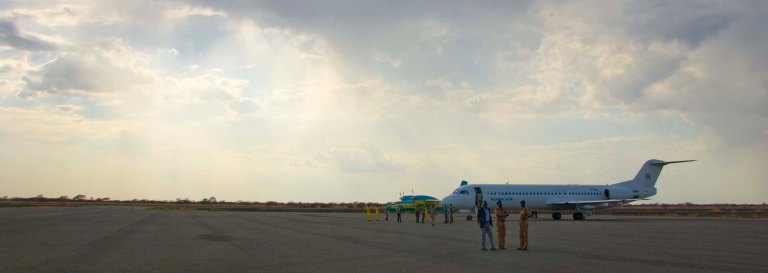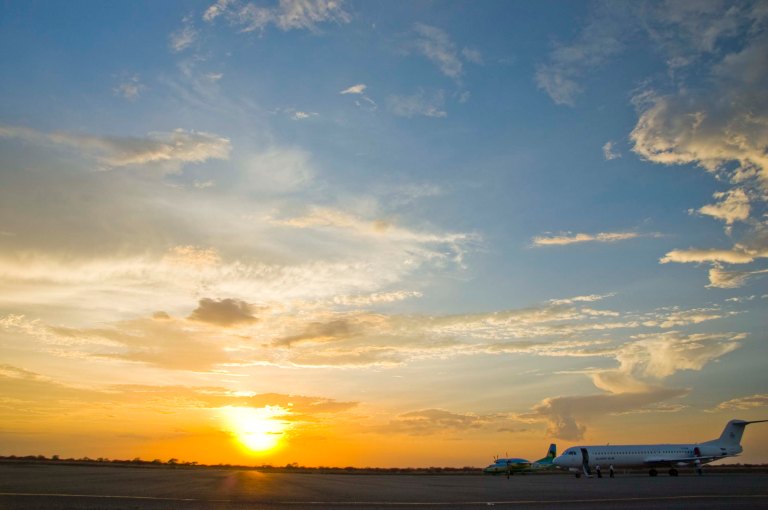
Il Fokker 100 che mi riporta a Juba è, così dice l’ingegnere portoghese della Kush Air incaricato della manutenzione, il primo (e unico) nel suo genere in tutta l’Africa Orientale. Siamo decollati da Paloch – pronuncia: Falush, o qualcosa di simile -, quasi al confine con il Sudan, verso le undici del mattino. Con qualcosa come 18 ore di ritardo sulla tabella di marcia. Il volo è gentilmente offerto dal Ministero del Petrolio e delle Attività estrattive, quindi non mi posso lamentare. Ma credo sia la prima volta che a tutti noi a bordo – un centinaio di persone, tra funzionari del governo, militari, dipendenti delle compagnie petrolifere e giornalisti – capita di rimanere bloccati a terra perché l’aereo ha la batteria scarica. Quando siamo arrivati in aeroporto, nel pomeriggio di ieri, in un primo momento ho pensato a uno scherzo. Il Fokker era lì, spiaggiato sulla pista deserta – a Paloch atterra un aereo al giorno, di norma, ed è invariabilmente quello (minuscolo) che fa la spola tra qui e Juba per i dipendenti della Darpetroleum – e sotto la curva immacolata della sua pancia, alcune persone armeggiavano con aria poco convinta. Due sportelli aperti, nessun cenno di vita all’interno dell’apparecchio. Aspettiamo, seduti sull’erba a bordo pista; lo scalo di Paloch è quasi più moderno di quello di Juba – non che ci voglia molto, dato che nell’aeroporto principale del Paese non funzionano gli apparecchi a raggi X e il check-in viene fatto compilando i moduli a mano – ma siamo pur sempre in Sud Sudan, e il concetto di area off limits (o di sicurezza aeroportuale) è assai flessibile. Due o tre formiche grosse come l’unghia del mio mignolo si intrufolano tra la caviglia e l’orlo dei pantaloni. Le scrollo via. Sulla pista, una ventina di persone, e altrettante versioni su quello che sarà il nostro destino. “Hanno chiamato Juba, serve un generatore d’emergenza per riavviare la batteria ma qui non c’è. Ora mandano un aereo, un’ora di volo ed è qui.” “Il contratto con la Kush valeva solo per oggi, e loro l’hanno rotto. Ora dovremo aspettare 3-4 giorni prima di poter rientrare” (le strade, durante la stagione delle piogge, sono impercorribili – rischieremmo di restare impantanati per settimane). “Rimandano indietro l’aereo dei ministri.” “Anche se dovessero arrivare, non faremmo in tempo: a Juba la pista di atterraggio non ha le luci per i voli notturni, dopo le sei è tutto bloccato” (vero. E c’è da aggiungere, come scopriremo poi, che essendo domenica la torre di controllo è deserta, per cui anche avessero voluto, nessuno avrebbe potuto dare il via libera alla “squadra di salvataggio”…) Dopo un’ora e mezza, appare chiaro che non andremo da nessuna parte. “Bokra, bokra”, domani, domani, ripete con aria rassegnata un addetto della Darpetroleum, infagottato nella tuta rossa d’ordinanza. Il sole sta tramontando sulla linea piatta dell’orizzonte. In Upper Nile, pare, puoi guidare per 50 chilometri senza incontrare un singolo albero. Non parliamo di eventuali rilievi. Eppure, questa terra punteggiata di tukul gialli e bruciati dal sole, su un suolo nero e spaccato che sembra un cretto di Burri, ha un suo fascino imperscrutabile. Il silenzio ci avvolge mentre torniamo al compound della compagnia petrolifera, dove ci accamperemo alla bell’e meglio per la notte. Nel nulla assoluto – anche i cellulari non prendono, da queste parti – ci si concede il lusso di chiacchierare con calma, di fare nuove amicizie, di ascoltare il buio della notte senza il chiasso dei generatori. Andiamo a dormire sapendo che non ci sarà sapone per lavarsi, nessuna biancheria di ricambio, niente colazione, e che risaliremo – forse, inshallah – sul nostro aereo puzzando come capre, dopo una giornata passata sotto il sole cocente del Nord. Al mattino, dopo un’ora e mezza di insensata attesa in aeroporto, ecco il rumore rassicurante di un aereo in fase di atterraggio: è l’Antonov mandato da Juba, con il generatore al sicuro nella stiva. Tempo mezz’ora, e siamo pronti per imbarcarci. “Fossimo stati in Europa, ci volevano quindici minuti e nessuno si sarebbe accorto di niente”, sospira Bruno, l’ingegnere portoghese, con la camicia bianca chiazzata di olio e sudore. Ma siamo in Sud Sudan, e diciotto ore di ritardo non sono nulla. Si viaggia così, da queste parti. E nel frattempo, si stringono nuove amicizie, e si osserva il tramonto a Paloch.

The Fokker 100 which brings me back to Juba is, according to the Portuguese engineer in charge of maintenance on behalf of Kush Air, the first (and only) of its kind in all of Eastern Africa. We took off from Paloch – pronounciation: not dissimilar from Falluja, without the final “a” -, close to the Sudanese border, around 11 am. With something as an 18-hour delay on the programme. The flight is kindly provided by the Ministry of Petrol and Mining, therefore I cannot really complain. But I believe it is the first time for all of us on board – a hundred of people, mainly government officials, army guys, oil company employees and journalists – to be blocked on the ground becuse the aircraft’s battery has no power. When we arrived in the airport, yesterday in the afternoon, at first I thought it was a joke. The Fokker was there, stranded on the empty runway – at Paloch usually lands a flight per day, and it is invariably the (tiny) one which travels back and forth between here and Juba, just for Darpetroleum’s employees – and under the immaculate curve of its belly, some people move around with a puzzled look. Two open doors, no sign of life inside the aircraft. We wait, sitting on the grass at the side of the runay; Paloch’s landing strip is almost more modern than Juba’s one – not a difficult achievement, since in the country’s main air terminal X-rays machines don’t work, and at the check-in boarding passes are filled by hand – but we are still in South Sudan, and the concept of “no trespassing zone” (or, for what it matters, of airport safety) is very flexible. Two or three ants, as big as my little finger’s nail, creep up between my ankle and the rim of my cargo pants. I shake them off. On the runway, some twenty people, and just as many versions on what will become of us. “They called Juba, we need an emergency generator to restart the battery but it isn’t available here. Now they are sending up a plane, one hour of flight and it will land.” “The contract signed with Kush was only for today, and they breached it. Now we’ll have to wait for 3-4 days before we can go back” (roads, during the rainy season, are impassable – we might get stuck in the mud for weeks). “They are sending back the ministers’ plane.” “Even if they should come back, we would be late: in Juba, the landing strip has no light for night flights, after 6 pm everything is shut down” (true. And it should be added that, as we will find out only later, since it is Sunday, the control tower is empty – so even if they’d wanted to, nobody would have been there to give the thumbs up to the “rescue team”…) After an hour and a half, it is clear that we won’t go anywhere. “Bokra, bokra”, tomorrow, tomorrow, repeats with a resigned look a Darpetroleum worker, wrapped in his official red fatigue. The sun is setting down on the flat line of the horizon. They say that in Upper Nile, you can drive for 50 km without meeting a single tree. Better not to mention elevations of any sort. And yet, this land dotted with yellow tukuls burnt by the scorching sun, standing on a black cracked soil which resembles one of Burri’s “crettos”, has its unintelligible seductive power. Silence surrounds us while we drive back to the oil company’s compound, where we will somehow take shelter for the night. In this total emptiness – even cellphones don’t work, around here – we allow ourselves the luxury to chat without being in a hurry, to make new acquaintances, to listen to the darkness of the night without the noise of generators. We go to sleep knowing that we won’t have soap to wash ourselves, no clean underwear, no breakfast, and that we will – maybe, inshallah – climb back on our airplane stinking like goats, after a full day spent under the hot Northern sun. In the morning, after an hour and a half of meaningless waiting at the airport, we hear the reassuring noise of an aircraft about to land: it is the Antonov sent from Juba, with the generator safe on board. In half an hour, we are ready to board the plane. “Had it happened in Europe, we’d need just fifteen minutes, and nobody would’ve realized there was something wrong”, sighs Bruno, the Portuguese engineer, his white shirt stained with oil and sweat. But we are in South Sudan, and an eighteen-hour delay is nothing. We travel like this, around here. In the meantime, we make new friends, and we look at the sunset in Paloch.